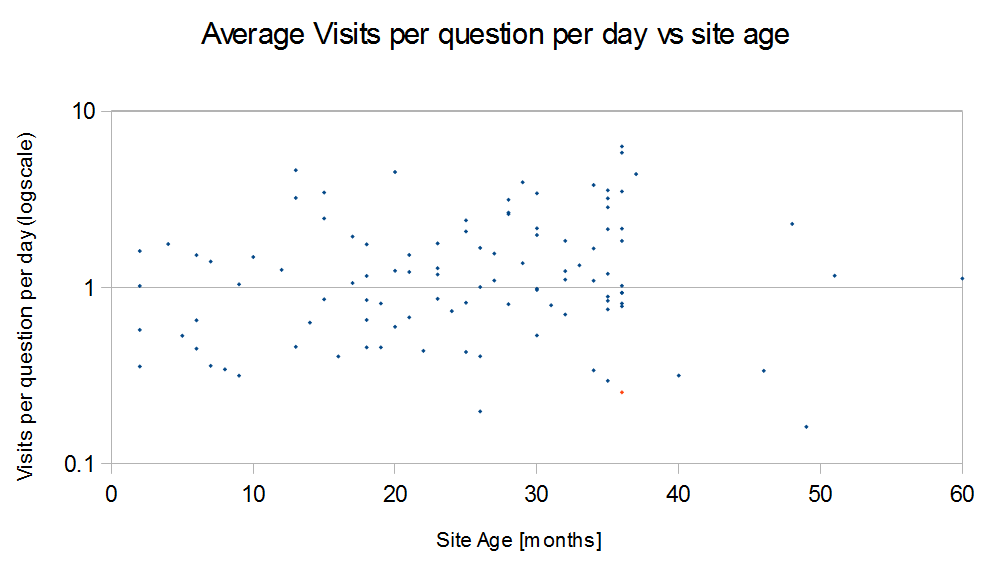Given that I collect network-wide statistics for fun (the data from this site alone gives over 700 numbers to play with, and I enjoy playing around with statistics so I collect that and other data on a daily basis), and I've been involved in other SE sites besides this one with very different cultures, I thought I'd contribute my 2 cents.
Here's a plot of all SE sites. Each data point is an individual site (104 points in total). The horizontal axis is site age (this is not so important, but I need a parameter to plot things against and age happens to be convenient). The vertical axis is the average visits per question per day on a logscale. The point corresponding to MSE is colored red.

As you can see, it's near the bottom; in fact, the only sites below MSE are Judaism and Meta Stack Overflow. Other sites which are low on this scale are Theoretical Computer Science, Genealogy, Stack Apps, MO, and Startups. The common feature here is that the posts on these sites tend to only be useful to a small number of people, while the top-trafficked sites (on a per-question basis) like gaming and cooking have questions which are useful to very broad groups of people.
The only legitimate way to get more traffic is for more people to find the pages on the site which answer questions they have. For SE sites, usually over 90% of the traffic is search traffic. Moderators have tools to determine how much of the traffic is coming from searches, but I don't think they're allowed to share the numbers. Of course, if there's a really cool question that is of interest to a lot of people, you can share it on various other sites, but this is never going to be a big source of traffic.
Conversely, low traffic is only a problem if it's because people aren't finding the pages which answer their questions. If this is the case (which I'm not sure of) then there are several things that can be done. The first, and most obvious, thing is to improve question titles. Titles get a lot of weight in search engine results (far more than the body and content of answers). The title needs to be phrased so that someone searching will hit all of the keywords, and other than that as brief as possible. Of course, this is probably impossible for PSQs, which are usually too specific to be searched for by lots of people, but for common questions about understanding concepts a better title can easily bring it from unlisted on relevant searches to one of the top results on Google. It's likely that avoiding MathJax in the title would probably help also (I don't know for sure on this point), though this can obviously only be done for some questions. Beyond titles, the only other big thing is to make sure that the answers actually do fully and completely answer the question, as there are plenty of alternative sites to go to if the answers here aren't good, and they'll end up as the ones getting most of the traffic.
Given a particular question, you can always check how well it's ranked by search engines by going to Google and searching for what the question is asking (though you have to be careful, as the phrasing of the question can bias you towards a specific way of asking the question). If you find the question in the first few results from Google, it's probably doing alright. If you find lots of other sites first, the question should probably be edited to have a better title. Also, if a particular question is frequently getting duplicated, it's an indication that question is probably of a lot of interest, and people aren't finding it.
Ultimately, though, I think MSE has a different approach than most SE sites, and the low traffic isn't such a big deal. The goal here isn't so much to disseminate useful information for future viewers as to be a tool to assist in learning mathematics. To that end, the questions are mostly useful to the original askers, which is typically not the case on most SE sites. This could lead to lower traffic, but that's not really a big deal if questions are getting answered.




Announcer. You have twoPublicistbadges -- share the secret! $\endgroup$